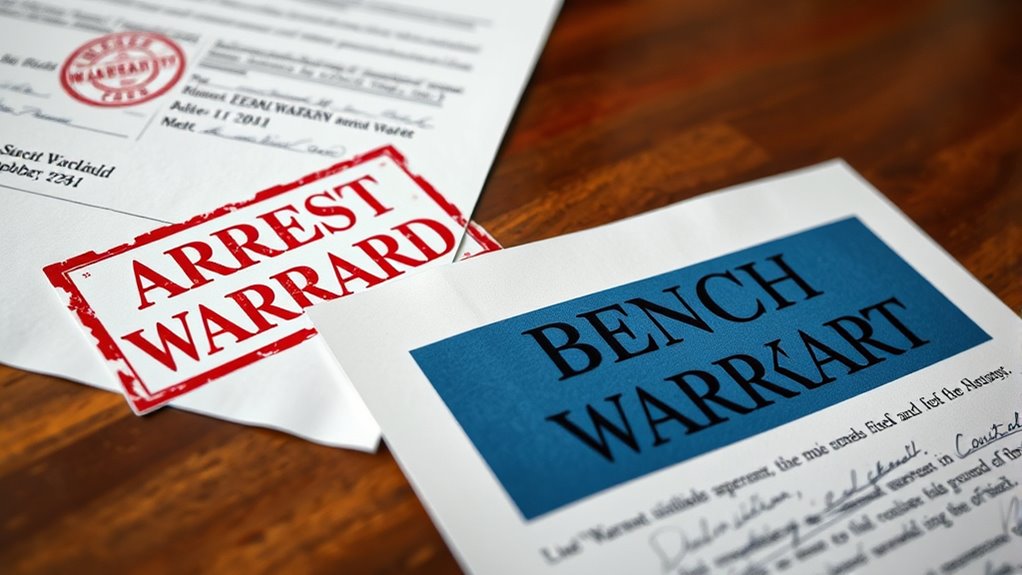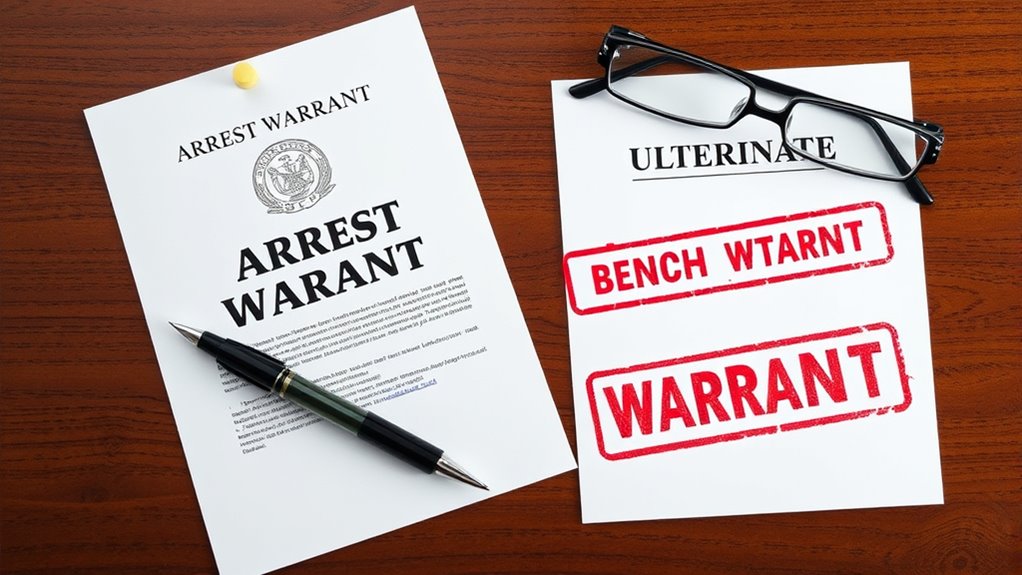An arrest warrant authorizes law enforcement to detain you based on probable cause that you’ve committed a crime, and it can be issued at any time, often without your knowledge. A bench warrant is issued when you fail to appear in court or follow court orders, and law enforcement can arrest you for this violation—usually without prior notice. Understanding the differences helps you act quickly and protect your rights; keep going to learn more about handling these situations effectively.
Key Takeaways
- An arrest warrant is issued for criminal activity based on probable cause; a bench warrant is for court violations or failure to appear.
- Arrest warrants allow police to detain you anywhere; bench warrants mainly authorize arrest for court-related issues.
- Arrest warrants are based on evidence review; bench warrants do not require new evidence, only court neglect or non-compliance.
- Arrest warrants may be known or unknown; bench warrants are often issued without your knowledge until law enforcement shows up.
- Responding promptly with legal advice is crucial to address either warrant and minimize legal consequences.

Understanding the different types of warrants is essential if you want to navigate the legal system effectively. When dealing with arrest warrants and bench warrants, knowing how they differ can prevent serious consequences. Both warrant types involve legal processes, but they serve distinct purposes and carry different implications. Recognizing the key differences helps you understand what actions might be taken against you and how to respond appropriately.
An arrest warrant is issued when law enforcement officials have probable cause to believe you’ve committed a crime. Probable cause means they have enough facts or evidence to reasonably suspect you of wrongdoing. The warrant issuance process involves a judge or magistrate reviewing the evidence and determining whether there’s sufficient grounds to arrest you. Once issued, an arrest warrant authorizes police to detain you, often anywhere, whether you’re at home, work, or elsewhere. The main purpose is to guarantee that law enforcement can bring you into custody to face criminal charges. If you’re aware of an arrest warrant, you should take it seriously and seek legal advice promptly to understand your options.
In contrast, a bench warrant is typically issued by a judge when you fail to appear in court as required. This type of warrant isn’t necessarily based on probable cause of a new crime but instead on your neglect or refusal to comply with court orders. For example, if you miss a scheduled court date without notifying the court, a judge may issue a bench warrant for your arrest. The warrant gives law enforcement authority to detain you, often to bring you before the court to address your absence. Unlike arrest warrants, bench warrants can be issued without any new evidence or probable cause related to criminal activity—they are primarily about court compliance. If a bench warrant is active, you might be unaware of it until law enforcement shows up, which can lead to unexpected detention and additional charges like contempt of court.
Understanding these differences is vital because they influence how and when law enforcement can act against you. An arrest warrant indicates there’s probable cause linking you to a crime, and it generally involves criminal proceedings. On the other hand, a bench warrant signals issues with court compliance and can be issued swiftly if you ignore court directives. Both warrants can be issued quickly and have serious consequences, but knowing the reason behind each helps you respond correctly. If you suspect you have either warrant, consult with a qualified attorney to determine the best course of action. Acting proactively can often minimize the negative impact and help you navigate the legal process more effectively.
Frequently Asked Questions
Can a Warrant Be Issued Without My Knowledge?
You might wonder if a warrant can be issued without your knowledge. Legally, warrant procedures can sometimes result in warrants being issued without your immediate awareness, especially if authorities act quickly or you’re unaware of investigations. The legal implications are serious, and you could be detained or arrested unexpectedly. To protect yourself, stay informed about any legal notices and consult a lawyer if you suspect a warrant has been issued against you.
What Happens if I Ignore a Bench Warrant?
If you ignore a bench warrant, you face serious warrant consequences and legal implications. The court may issue a bench warrant for your arrest, and law enforcement can arrest you at any time. This can lead to jail time, fines, and a court appearance to resolve the matter. Ignoring it only worsens the situation, so it’s best to address the warrant promptly to avoid additional legal trouble.
Are Arrest Warrants Always Issued for Serious Crimes?
Think of arrest warrants as a lock, opened only when there’s enough probable cause. Not all are reserved for serious crimes; some are issued for minor offenses or failure to appear. The warrant’s validity depends on its proper issuance and adherence to legal standards. So, if authorities believe there’s enough evidence, they’ll issue a warrant, but it’s not always reserved for the most serious crimes—just enough to justify the lock.
Can Warrants Be Issued for Minor Offenses?
Yes, warrants can be issued for minor offenses like traffic violations or probation violations. If you ignore a traffic ticket or violate probation conditions, authorities may issue a warrant for your arrest. Even small infractions can lead to warrants, especially if you don’t respond or appear in court. It’s important to address these issues promptly to avoid more serious consequences and unnecessary arrest.
How Can I Find Out if I Have a Warrant?
To find out if you have a warrant, start by checking online databases or court websites, which often list warrant procedures and legal notifications. You can also contact the local law enforcement agency directly or visit the courthouse. Keep in mind that warrants may be issued for various reasons, so staying proactive helps you address any legal issues promptly and avoid surprises or penalties down the line.
Conclusion
So, now you know the difference between an arrest warrant and a bench warrant. One’s like a formal invitation to court, while the other’s more of a surprise party you didn’t RSVP for. Either way, ignoring them isn’t exactly a winning strategy—unless you enjoy the thrill of an unexpected visit from the authorities. Stay informed, stay compliant, and avoid turning your life into a courtroom drama. After all, who needs that kind of excitement?









